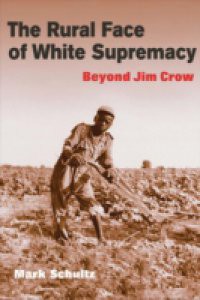Mark Schultz entered rural Hancock County expecting to confirm the standard expectations about race relations in the South, an area characterized by frequent lynchings, systematic segregation, and universal black poverty. What he found undermined and confounded his sweeping assumptions about the ostensibly "solid" South. _x000B_The Rural Face of White Supremacy is a detailed study of the daily experiences of ordinary people in rural Hancock County, Georgia. Drawing on his own interviews with over two hundred black and white residents, Schultz depicts the rhythms of work, social interaction, violence, power, and paternalism in a setting much different from the more widely studied postbellum urban South. _x000B_By acting on the basis of personal rather than institutional relationships, Schultz argues, Hancock County residents experienced more fluid interactions and more freedom than their urban counterparts had. This freedom created a space for interracial relationships that included mixed housing, midwifery, church services, meals, and even common-law marriages. _x000B_These relationships were both intimate and hierarchical and marked by personal, sexual, and economic violence; more important, they were far more complex than the conveniently efficient and modern ideal of Jim Crow. _x000B_

